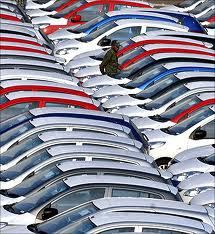 The base is low.
The base is low.
The vehicle penetration level is modest as compared to other regions. But the trend is definitely positive in the eastern region of the country, even in the depressed automobile sales growth environment.
Even in the commercial vehicle segment, the eastern region has seen a modest growth, amidst a decline in all other regions.
Region-wise auto sales data available with Business Standard clearly suggest that whether it is the passenger car segment or two-wheeler sales, the eastern region showed growth in the first two quarters of this financial year.
In CVs, the region registered growth in excess of 10 per cent in the first quarter (April-June).
The quarter ending September saw a marginal decline in the segment.
Other regions saw a five to 30 per cent decline in CVs in the first two quarters.
It is a case of ‘smaller states doing better because of government effort, as well as low base”, is how Madan Sabnavis, chief economist, CARE Ratings, explains the regional variation.
The eastern region’s better showing here could be related to the fact that most states, big or small, registered per capita net state domestic product growth higher than the national average in the last financial year.
Some of that buoyancy might have spilled over to this financial year as well.
Bihar, for instance, had shown a growth in per capita NSDP of 13 per cent in 2012-13.
West Bengal with 6.65 per cent, Sikkim with 6.61 per cent and Odisha with six per cent did better than many other states.
“States with a modest industrial or manufacturing base have suffered less in this current phase of slowdown.
“The consumption growth has been resilient in states where industry’s share in overall gross domestic product has been marginal,” says a top executive of a fast moving consumer goods company.
Steady rise
What has also helped the eastern region is the renewed focus on augmenting agricultural production, by way of budgetary support for what is known as the ‘green revolution in the east’.
The east might have also benefited from a good monsoon and strong demand in rural areas and small towns, says Prayesh Jain, associate vice-president,
“What is surprising is that the same factors did not lead to revival of growth in the passenger car segment in the north,” he adds.
The northern region did see some pick-up in demand for passenger cars and two-wheelers in the last quarter.
The CV segment, however, saw a decline of 17 per cent in the region during the last quarter.
The eastern region, though, has witnessed a steady up-move.
In the April-June quarter, companies sold 45,576 passenger cars here, 2,540 more than what they sold in the same quarter last year.
In the quarter ending September, the eastern region registered sales of 44,966 units in passenger cars, 3,420 more than the same period last year.
“The east is growing because of a low base.
“The region contributes less than 10 per cent of total auto sales volume in the country.
“The region might also have benefited from a lesser impact of the recent economic slowdown,” argues Yaresh Kothari, auto analyst at Angel Broking.
Analysts feel there is likely to be a revival of demand in the northern region in the current quarter, on the back of a strong monsoon.
What is worrying the latter community, though, is the steep fall in demand for CVs in the north, south and west.
In the last quarter, the west saw a dip from 69,167 units in the same period last year to 53,231 units.
The southern region saw a fall from 61,147 units to 40,665 units; the northern region saw a drop from 43,662 to 36,218 units.
The eastern region saw a modest fall from 26,329 units to 26,187 units.
Analysts attribute the fall in demand for CVs to the ongoing Telengana agitation in Andhra Pradesh, the mining ban in Karnataka and below-par performance of the manufacturing sector.
The only silver lining is that the two-wheeler segment has shown good growth in the north, east and west. However, the southern region saw a fall even in this segment.











 © 2025
© 2025